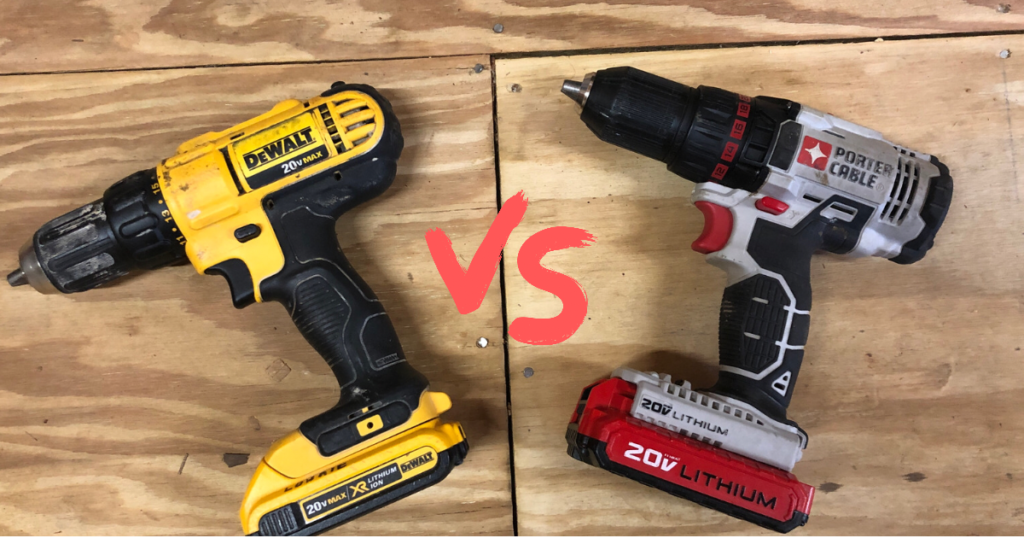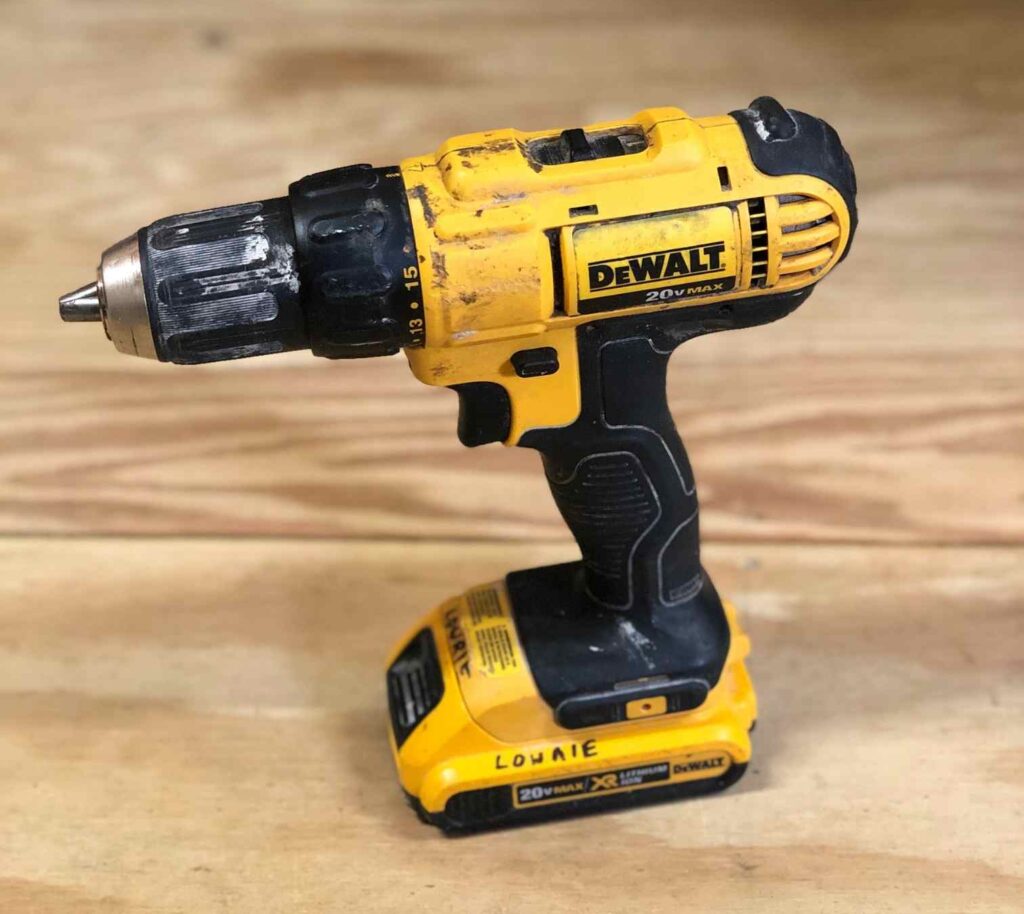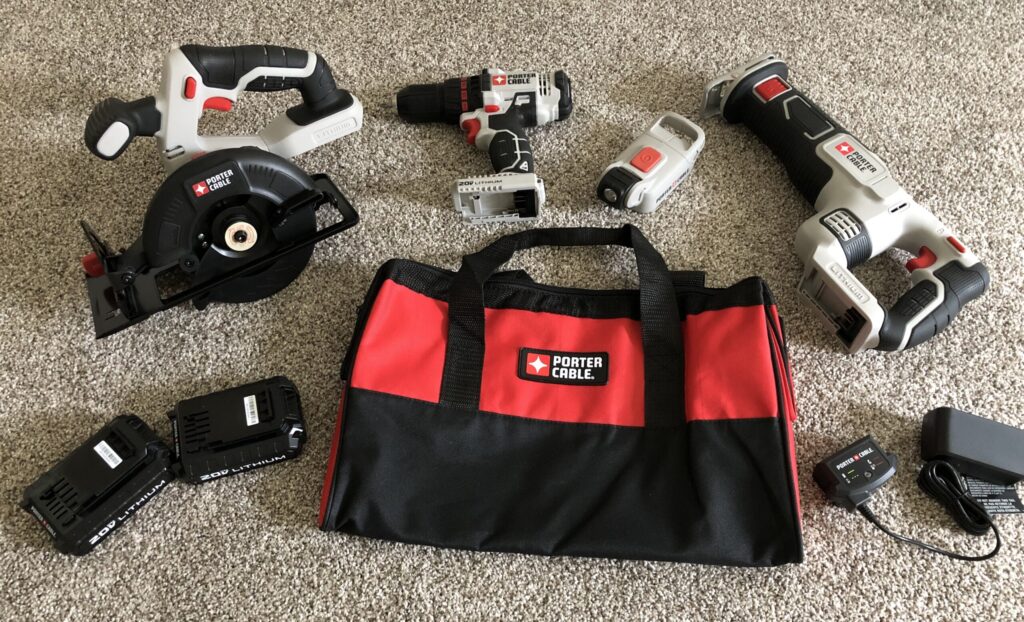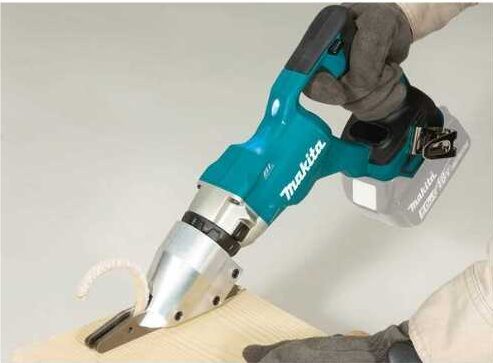
Two of the most popular power tool companies, and two of the most popular drills. When searching for a cordless drill, the options seem to be endless. Since you’re here, I’m assuming you’re research has led you to Porter Cable vs Dewalt to see who comes out on top.
I was able to purchase both Porter Cable and Dewalt brushless drills before some major renovations. In this article, I will go over some of my first impressions, their comfort and ease of use, and most importantly – how both drills performed for me. First lets take a look at some of their non-performance related aspects…
Brushless motor provides 50% more runtime. The powerful motor has 370 MWO of power for heavy duty applications with minimal stall1/2-inch ratcheting chuck is made for improved and reliable bit retention. Transmission delivers 1,800 MAX RPM.
History
Both Porter Cable and Dewalt started in the early 1900’s. Porter Cable started in 1906 in Syracuse, New York, while Dewalt began in 1924 in Lancaster, Pennsylvania. Porter Cable Originally made a name for themselves for their popular belt sanders. The company was lead by the infamous engineer Art Emmons, until being sold to Rockwell Corporation in 1960.
Both Dewalt and Porter Cable struggled to keep up with the price of Black and Decker tools since their inception. Today, both companies are owned by the parent corporation Stanley Black & Decker.
Warranty
Both Drills come with a 3 year warranty. If anything breaks during use of the tool, Porter Cable or Dewalt will replace the drill. However, Porter Cable’s 3 year warranty only applies to the drill itself – the battery is only covered under a 2 year warranty.

Giveaways, Ebook, and Forum coming soon. Be the first to know about new content!
Specs
| Porter Cable | Dewalt | |
| Weight | 4 lbs | 4lbs |
| LED Guide Light? | Yes | Yes |
| UWO* (Output) | 289 Watts | 300 Watts |
| Speed (RPM) | 1500 RPM | 2000 RPM |
| Origin | China | USA |
Price
Brushless motor provides 50% more runtime. The powerful motor has 370 MWO of power for heavy duty applications with minimal stall1/2-inch ratcheting chuck is made for improved and reliable bit retention. Transmission delivers 1,800 MAX RPM.
Compact and lightweight design that fits into tight areas. High performance motor delivers 300 unit watts out (UWO) of power ability completing a wide range of applications. High speed transmission delivers 2 speeds (0-450 & 1,500 rpm)
First Impressions – Dewalt vs Porter Cable
At first glance the dewalt is noticeably heavier, better looking, and feels more comfortable in the hand. Although the Porter cable drill is similar, it feels lighter, cheaper, and overall has an underwhelming aesthetic as opposed to the Dewalt counterpart.
After 1 Month Of Use…
During the first month of owning these two drills, I built a large deck. Making sure to use each drill for an equal amount of time to get a feel for how they performed.
Dewalt

It became blatantly apparent to me that the Dewalt cordless drill had more power. I also bought the corresponding impact drivers for both of these drills, and the same can be said about the dewalt impact driver.
During the deck installation, I would use the dewalt drill when installing lag screws into dimensional lumber. This is because these screws often need to pierce multiple thick layers of wood, a task that requires the more powerful of the two drills.
Porter Cable

As discussed above, the porter cable drill initially showed obvious signs of being marginally weaker. With that being said, I had no other complaints. The drill operated flawlessly, never missing a beat. I used the porter cable drill to screw down all of the deck boards and it ran perfectly. Although if I had to screw down a whole deck’s worth of boards again I would use a screw gun to save time.
Over the year I used the Porter cable drill on many projects in and outside of the house. I used the porter cable drill when installing porch columns, and building a new shed.
Battery Life
Anyone who uses cordless drills knows battery life is a make-or-break aspect to the experience with your tools. Constantly changing out batteries is a drag. As a result, battery life is a key component being considered in the Porter Cable vs Dewalt challenge.
Both the Dewalt and Porter Cable drill operate using 20V battery systems. The Dewalt drill came with a docking station style charger which takes up more space, and barely fits in the zippered contractor bag when coupled with the drill. However this charger can be mounted to a horizontal board or any surface, an aspect that I like.
Our Porter cable 20V drill came with a standard wall charger which, correlating with our first impression, felt cheaper, lighter, and easier to break. Porter cable offers a docking charger on their higher priced drill packages.
However I did manage to buy these aftermarket batteries that work with porter cable tools. These are much cheaper than porter cables brand name batteries, and seemed to last a bit longer.
After only a few months of using both drills, it was very noticeable that the Dewalt had a much longer lasting, reliable battery. I found myself going through Porter Cable batteries many times over while my one Dewalt battery still had time to work. In contrast, Porter Cable batteries are much cheaper than their expensive Dewalt 20V cousins.
Comfort & Ease of Use
Please understand I feel very nit-picky when writing this. Both tools are fine to work with, but my intent is to be the critic so you can choose the right drill for you.
I felt that the Dewalt drill was overall more comfortable in my hand for long periods of time. Anyone with construction experience knows that after using a drill all day, they can rub the inside of your thumb and pointer finger raw. I noticed less pain after a long day of use with the Dewalt drill. On the contrary, with the Porter Cable Drill I would notice this area of my hand to be quite raw, and uncomfortable after a long day’s use.
The Dewalt drill is also more compact, and easier to fit into tighter spaces. The measurements differ slightly, however the space saved by the Dewalt drill being slightly thinner, and shorter came in handy when operating between rafters.
Here are some Pros and Cons of each Drill as according to me


The Broken Drill…
I was having a hard time choosing a winner. They both worked without flounder. Could I really give it to Dewalt based on a slight increase in battery life, and a meager increase in torque?
Until one day…
One day while drilling pilot holes into concrete, my drill lost power. I initially blamed the battery, but after a charge the drill was still rotating at 1/10 the speed I needed it to. The Dewalt had succumb to the beating I was putting it through.
Now….I WAS drilling on the fastest setting possible into concrete; putting the drill through a lot of stress. However I finished the job, and drilled 3 more holes with the Porter Cable drill, and it lived up to the task. I knew I had found a winner in the Porter Cable vs Dewalt showdown.
And the Winner is….
My winner is the Porter Cable drill. Although I talked about many of the Dewalt’s better aspects, when you take the breakage into account, the identical warranty, and Porter /cables substantially lower price, I believe the Porter cable drill is a better option. Most of the negatives I discussed about the Porter Cable drill were purely aesthetic, or comfort in nature.
Brushless motor provides 50% more runtime. The powerful motor has 370 MWO of power for heavy duty applications with minimal stall1/2-inch ratcheting chuck is made for improved and reliable bit retention. Transmission delivers 1,800 MAX RPM.
With that being said, if you are a contractor, doing a whole home renovation, or simply have the money to spend, go with Dewalt. Dewalt’s tools are of a quality that can’t be beat. However, their tools are typically more expensive across the board.
Kits

These kits are a great option for a first time homebuyer, making certain that any task around the house can be taken care of. I personally bought this Porter Cable Kit. It’s reliable set of 20V tools to have for small to medium sized projects, and the kit is under $200.
In hindsight I would have bought a slightly larger kit to include an oscillating tool, and a larger saw.
A great intro into Dewalt tools, in my opinion this toolkit is priced very well for what you get. My only recommendation would be to add a backup battery, you can even use the off brand ones from amazon, they work fine.
If you're on a tight budget, this combo kit gets the job done. I purchased this kit when I was first starting out, and everything worked great. The skillsaw is very small, so make sure it's big enough for what you need to do.
If you are looking long term, or planning to take your skills professionally, I would recommend this Dewalt tool kit. Although much higher in price, It has everything you need to take care of major renovations and can be added onto. Dewalt has a much larger selection of 20V tools, so building out from this kit is an option(?)
When its all said and done…
The truth of the matter is BOTH of these drills are top notch. The Porter Cable drill is on the cheaper end of the spectrum. Dewalt has and always will be the cream of the crop, premium power tool brand. If I had the money to spend I would buy Dewalt tools over Porter Cable; key phrase being if I had the money to spend. I would also choose a Mercedes over a Kia with this qualifying phrase.
All in all the Porter Cable Drill won our comparison due to the fact that it’s still running to this day. My Dewalt Drill is not working, therefore it cannot win. I was just over the 3 year warranty so unfortunately I’ll have to buy another Dewalt if I choose to go with their brand again. It’s also worth checking out other brands such as Milwaukee and Makita.
I hope my experience gives you a little insight, and helps you consider some key attributes when making your decision. Feel free to contact me with any questions/comments. My email is always at the bottom of the page. Cheers!

Max
Max Lowrie, founder of MySplitLevel.com® and author of The Live In Flip© bought his first split level house in 2016. During a lengthy renovation, Max noticed that there was little useful content online specific to split-level homes. Max now devotes his time to share his knowledge hoping to help homeowners avoid unnecessary mistakes, and provide a blue print for split-level owners nationwide.
Giveaways, Ebook, and Forum coming soon. Be the first to know about new content!




